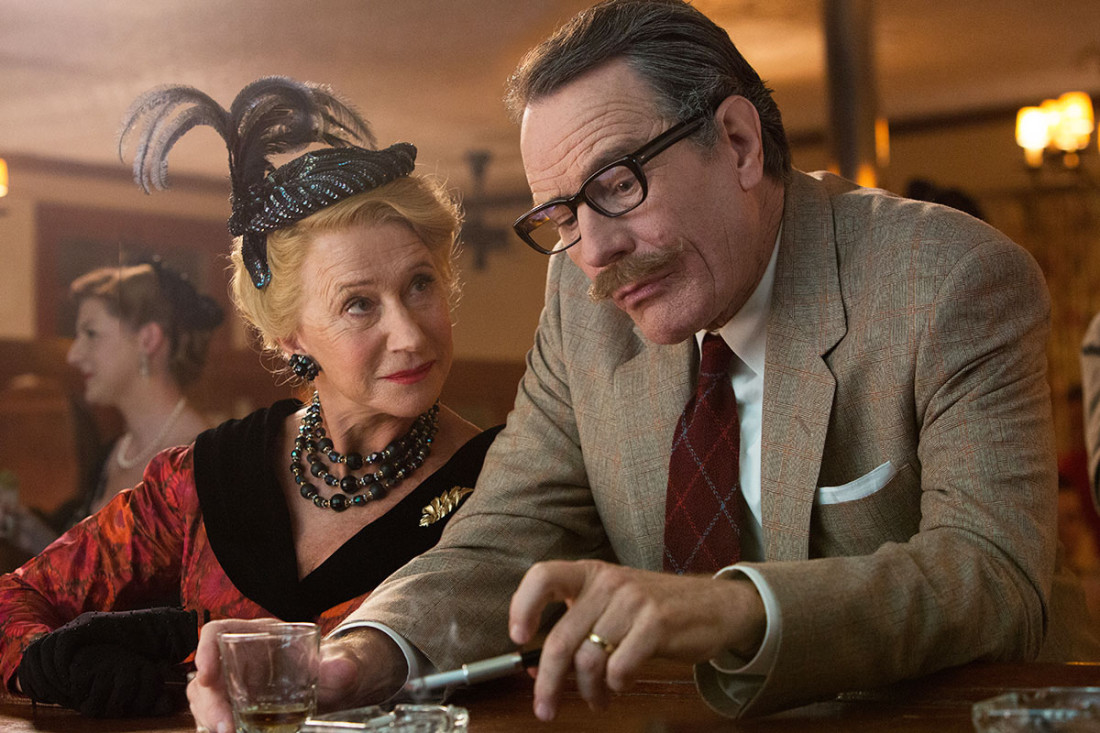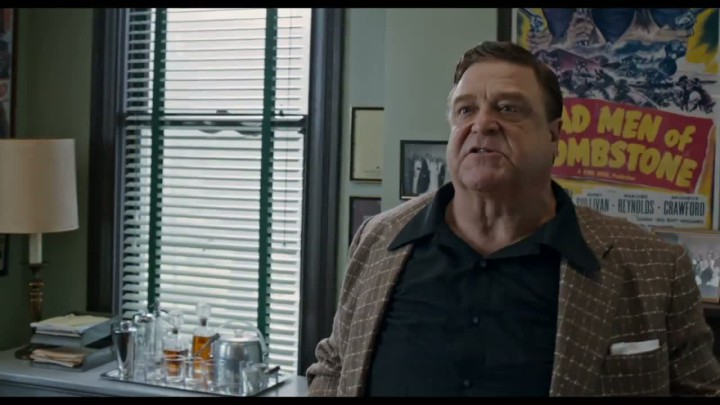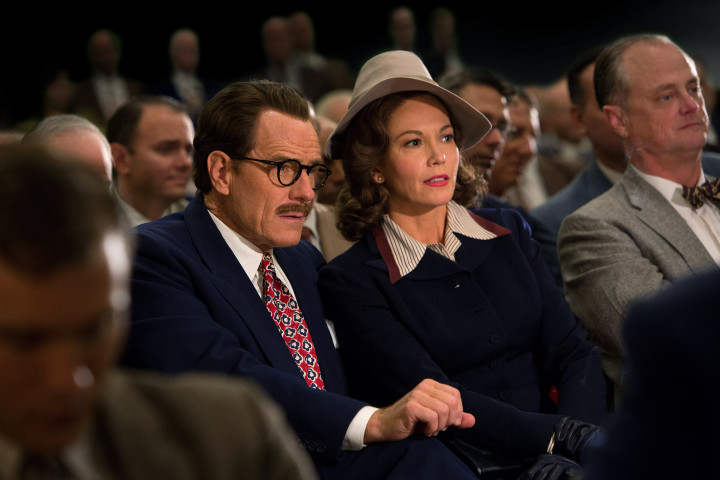Jay Roach’s Trumbo is something of a miracle — in part because it’s from Jay Roach, a man whose directing career previously peaked with the Austin Powers movies. At the very least, there’s nothing in his filmography that suggests he’d be suitable for this. Toss in the fact that, on the surface, it bites off more than it should be able to chew by covering not just Dalton Trumbo’s (a brilliant Bryan Cranston) life and career from 1947 to 1970 but also the story of the Hollywood Ten, the House Un-American Activities Committee, the blacklist and the defeat of that same list. Does the film telescope events and simplify some things in order to do this in two hours? Does it create scenes to make its points? Of course, it does. It has to. Does it work as powerful drama all the same? Like gangbusters.
I wish it wasn’t opening the same week as Brooklyn, however. Not only does that pit two must-see movies against each other, but it lands me squarely in the position of having two “Weekly Picks” that cannot be accommodated easily (if at all) in the layout. More than that, I wish the film was simply an historical record, but it’s not — especially in a world where certain political pundits have been trying to paint a positive picture of HUAC and the blacklist. Trumbo is unfortunately as relevant today as it ever was. It almost works as allegory. The distance between one of the major architects of the blacklist, gossip columnist Hedda Hopper (Helen Mirren), and modern pundits like Ann Coulter is very small. And when, in the course of the film, it’s suggested that all members of the Communist Party should be put in camps, it cuts even deeper. (It should be noted that it was not then, nor is it now, illegal to be a party member.)
A certain amount of criticism that has been leveled against the film is that it tells “us” nothing we didn’t know already. That idea — being put forth by film-savvy writers who presumably know the history — works on the faulty assumption that there is a unified “us.” There’s not. Did I learn anything new? Probably not, but I’m also 61 years old and steeped (some would say too much so) in film history, which includes this chapter. But, if I was in my 20s, 30s or even 40s and not conversant with this history, would I still say that? My guess is no. As such, I’m not on board with the argument that it tells “us” nothing new. More than that, though, it tells it in a surprisingly entertaining manner — skillfully blending outrage, bleak humor and genuinely moving scenes.
What Trumbo gives us is a portrait of the writer — in all his sometimes wrong-headed prickliness — and his circle being harassed and even imprisoned for their political belief that congress had no legal right to ask them the infamous “Are you now or have you ever been a member of the Communist Party?” question. It also offers a trenchant behind-the-scenes look at the forces behind the witch hunt and the blacklist. As noted, some things are simplified — the idea that Kirk Douglas single-handedly broke the blacklist by crediting Trumbo as writer on Spartacus in 1960 is hardly the whole story, but it serves dramatically. Similarly, the scene where Hedda Hopper browbeats Louis B. Mayer (a staunch right-wing moralist himself) into submission by threats of bringing up the Jewish heritage (and real names) of nearly all the industry’s moguls to play on the public’s anti-Semitism may be invented, but the tone is very authentic. That sense of authenticity, I think — along with just how entertaining and important the film is — raises Trumbo to greatness. Rated R for language, including some sexual references.








You know, as many times as John Goodman plays an intimidating confident producer/money man, I love it. He just fits the role so well and seems to enjoy it so much. Not ever a dynamic character, just a a likable one.
Goodness knows he’s likable here.
I saw Trumbo over the weekend and found it fascinating and illuminating although I did find Bryan Cranston’s performance as Trumbo more caricature than real person. Afterwards I did a lot of research about that time in our history and Trumbo in particularly – something a good biopic usually inspires me to do. One thing I discovered that disappointed me is that in the film, actor Edward G. Robinson is portrayed as betraying Trumbo and others by naming them before the House Un-American Activities Committee. This actually did not happen. He did testify three times before the committee and eventually stated that he had been a dupe of communist front organizations but he never named anyone he knew as a communist. Considering the high cost that members or sympathizers had to pay I don’t think anyone can blame him for distancing himself from the communist party – but depicting him as turning his friends in when that didn’t really happen (either for dramatic effect or to push the story forward) seems like a lousy thing to do for any reason. I wished they had used a fictional character to serve the same purpose.
The documentary Trumbo is even better. Trumbo was a prolific letter writer and director Peter Askin gets Joan Allen,
Brian Dennehy, Michael Douglas, Paul Giamatti, Nathan Lane, Josh Lucas, Liam Neeson, David Strathairn and Donald Sutherland to read them – all quite well, especially Lane. That’s not the whole movie, but those are the parts I remember most 7+ years later.
Thanks Edwin – I will definitely check it out!
You’re welcome! Enjoy.
@Lisa – good for you for doing research. You’ll want to keep at it regarding movies BASED on actual events/people because Hollywood is putting out plenty of twisted stories. Although I get fleshing out a story and needing a boogeyman, etc. their disclaimers at the beginning of a film really ought to be more genuine and truthful.
As an example of how bad it can be, The Imitation Game was utterly stuffed with inaccuracies and fabrications not to mention blatant and cheesy political overtures. And for the icing on the cake — that film won the Academy Award for best screenplay. That was beyond the pale!
their disclaimers at the beginning of a film really ought to be more genuine and truthful.
You could put “None of the following is true” on there and it would make no difference. There was supposedly a poll back in the mid-90s that found that 75% of the respondents thought Forrest Gump was a documentary. (That it was a poll of Newt Gingrich voters may or may not be a factor.) You’d be surprised how often I’m told, “But it was true” about any fact-based story. Hell, I once stood behind some people who were looking at the poster for The Texas Chainsaw Massacre (the remake), who were not only claiming that it was true, but that the footage at the beginning was TV news film.
“You could put “None of the following is true” on there and it would make no difference.”
Ken – big sigh…..I know that you are largely correct in that statement, unfortunately. But, I don’t believe in pandering to the lowest common denominator. It’s a self-fulfilling prophecy.
When watching American Hustle in the theater, several people, (incl me) were chuckling at the disclaimer: ‘Some of this actually happened’. We saw it and got the point. And in my case, I mentioned it when talking about the film afterwards with some people who hadn’t noticed or had forgotten it. Sometimes ya gotta roll the ball uphill. Tiring but, it’s better than selling out.
I’m going to venture that the Forrest Gump poll results had more to do with region of the country polled than political affiliation. I can assure that the educated, mostly left-wing crowd in my film group are plenty dismayed when it’s pointed out that aspects of a film are untrue. But they very much wanted to believe otherwise because those aspects fit their worldview. I am certain that some wish those facts had not been put forth as the bubble is preferred.
Do you have an opinion of the website: historyvshollywood.com?
Also, does this comment section recognize HTML code? Is that how you are able to bold and italicize? Thanks.
I think my problem with all this is that it all stems from judging drama on historical fact. And I’m not at all sure it’s that important, though I think it’s important that viewers not accept what they’re watching is history. (History is slippery enough.) To me, it’s pandering to insist that drama has the responsibility of making it abundantly clear to the viewer — more than the disclaimer (which is actually a legal concern) — that what they’re watching isn’t 100% true. Saying “based on a true story” strikes me as quite enough. (The most specious ones are the ones that boldly claim, “This is a true story.”) Do you feel that a production of Shakespeare’s Richard III needs to warn the audience that it’s mostly untrue?
As for the website, I’ve no opinion on it — not in the least because it doesn’t really establish the bona fides of the source. Also, I just don’t think that historical accuracy is an especially good barometer of artistic merit. I do think it interesting, but I’m not married to it. I think, for example, that The Danish Girl errs badly as a movie because its turning fascinating history into a formulaic Hollywood story — not so much because it’s wrong as because it’s pedestrian.
Yes, it’s simple HTML.
Appreciate the question as it caused me to examine/refine my thinking on the topic of disclaimers and misrepresentations.
First, I’ll say I feel movie makers have no obligation to present an entirely factual movie if based on actual people/events. There is no such thing as the movie police so they can tell a story however they like. However, from a moral and decent (yes those still exist, although in short supply) perspective disclaiming The Imitation Game merely as: Based on true events — when much of the historical reality was very misrepresented, trumped-up and intentionally misleading is, frankly, total BS. I certainly get why lame disclaimers are used. It’s a ruse for revenue purposes and that goal is likely achieved because “true stories” sell well if decently produced.
Alan Turing played a valuable role in code breaking during WWII but he was not NEARLY “the genius that brought the war to an end” nor was he the first to break the Enigma machine – not even close. And his chemical treatments ended over a year prior to his death whereas the movie portrays him looking ghostly white, gaunt and ravaged from treatments and then ‘committing suicide’ (many debate whether it was that or accidental). The omission of 14 months of time was intentional to make the audience believe the treatments were just too much to bear so he killed himself. Wow, fabricate much? The list of falsities goes on and on with that movie. Their agenda was obvious to anyone bothering to think and read up a little.
As a contrast, in Philomena, the fact that she did not really come to America as was portrayed in the film doesn’t really matter, to me. It was a necessary fleshing of the story that doesn’t reflect negatively on history or persons. So, the distinction for me is — if the historical reality is so substantially altered as to barely be ‘based on true events’ then it’s ridiculous to make the claim. But, I know, it’s not likely to change. Perhaps if I and others keep bitching about it at least more movie-goers will realize these films are not documentaries.
Lastly, I’d probably be satisfied if the disclaimer I’ve seen on lots of Made for TV movies was used. I believe it’s: A dramatization of real events.
Disclaimers of any kind only came into existence because MGM got sued over fictionalized versions of real people (still living at the time) over Rasputin and the Empress in 1932.
I think the best disclaimer of all is on DeMille’s The Plainsman (1936) — “Among the men who thrust forward America’s frontier were Wild Bill Hickock and Buffalo Bill Cody. The story that follows compresses many years, many lives, and widely separated events into one narrative — in an attempt to do justice to the courage of The Plainsman of our west.” In short, it’s a mix of fact, legend, hearsay, and outright lies.
I may be awfully dumb, but what is this “obvious agenda” of the makers of The Imitation Game?
Love The Plainsman disclaimer! See, at least they outright admit they created their own story and aren’t trying to infer “it’s basically true”.
No, you aren’t dumb, Ken. I concur with most of your reviews therefore it’s impossible for you to be dumb — see how that works? (wink)
Obvious agendas – when movie makers distort the reality so dramatically such that it’s become NON-reality (while claiming to be based on true events) and purely for the purposes of:
1) making as much $$ as they can while intentionally attempting to dupe the audience about authenticity
2) fronting current political/social views by portraying the people/ideas of prior eras as fools or evil, ETC. It’s vastly arrogant and wrong-headed. I read a quote recently which I love; it is: “the past is like a different country, they do things differently there.” Indeed!
They are tapping into a pet-peeve of mine, and others, which is: overlaying our current understanding and sensibilities of this world onto people and events of the past and in a contemptuous manner! It’s absurd. As I’ve pointed out to many people — in as soon as 20 years from now people will be looking back at our views and decisions of today with similar disdain so we ought have some humility and exert in trying to understand the context of why history has happened the way it has. Milton Ready, retired professor at UNCA wrote an op-ed for this paper a couple of months ago about this very thing. So, yeah, at the very bottom of my irritation about all this is the arrogant contempt cast at real people and events of the past. (Btw, not that it matters but, I agree with many of the social views of our day. This is just such a hamfisted way of putting them forth).
Off to see The Big Short today and will have some comments about it, under its review.
Honestly, the only agenda I see with a movie like Imitation Game is an attempt to win an Oscar with a glossy repackaging of history that’s easily digestible, non-threatening, and entertaining. And, yes, I think it was passingly entertaining, but it certainly didn’t stay with me. Its screenplay Oscar wasn’t won for historical accuracy, but for how it played.
“The past is a foreign country: they do things differently there” is the opening line of L.P. Hartley’s 1953 novel The Go-Between (filmed in 1971 by Joseph Losey). I think we’re approaching this from different angles. I don’t take the alterations of the characters and/or views as arrogant or really agenda-driven. Most art reflects the time it was made — especially drama and movies — in large part to make it accessible and/or relevant to the audience of the age. That’s why — to take a relatively safe example — a movie like The Jolson Story (1946) presents Jolson’s songs in brash, slick sound of the era in which it was made. Had they accurately reproduced what the pre-electronic records from the ’20s, it would have been a disaster with the public. (That the film is one long list of Jolie-mythologizing BS is another matter.)
At the end of the day, my feeling is simply that anybody who goes to a biopic or an historical drama thinking it’s a documentary deserves it.
“At the end of the day, my feeling is simply that anybody who goes to a biopic or an historical drama thinking it’s a documentary deserves it.”
Well, okay. But, I’m thinking that since you sort-of live the industry you may not realize how many regular people (professional, educated ones, at that) DO believe that most of what they saw is true. And, naturally, they don’t know what parts were/weren’t factual. Worse, they don’t seem to care. However, many reviewers on IMDb noticed and were also quite bothered by the same aspects that irked me.
Trumbo – I very much enjoyed that film. It was very atmospheric and addressed issues and an era I hadn’t seen much about. Both directing and acting were first rate.
I did say to my friend, after leaving, “you suppose any of those people who joined the American Communist party had ever visited a Communist country?” He figured ‘no’ ….as did I. Well, I’ve been to 3 of them and it’s all a person needs to do to cure themselves of communist utopian fantasies. They’re wretched places. I understand why US citizens and officials feared those ideas taking flight here. But, they were too ham-fisted in their approach to mitigating it, yes.
many reviewers on IMDb
You lost me here.
Ahh yes, I meant numerous reviewers of: The Imitation Game. Particularly some of the British ones, as I recall.
The “official” reviewers or those on the boards?
What they refer to as: User reviews — as opposed to Critic reviews.
Here, have a gander, the first 2 pages provide many disgruntled viewers who offer specific detail: http://www.imdb.com/title/tt2084970/reviews?ref_=tt_ov_rt
“User Reviews” — yes, well…
“User Reviews” — yes, well…
Are you ribbing on the word: User? Or are you disparaging people?
Disparaging is too strong. Taking a bunch of people — usually posting behind aliases — about whom I know nothing at their word is…well…
Absolutely outstanding. Slap me silly for not seeing this on opening night. I practically study the cold war every day and always love a film about the darkside of Hollywood. I’m very thankful Asheville Brewing is showing it this week. The first film I saw on this subject matter was 1990’s GUILTY BY SUSPICION. If memory serves, its not as good as this. Need to see that again. I will buy a copy of TRUMBO asap.